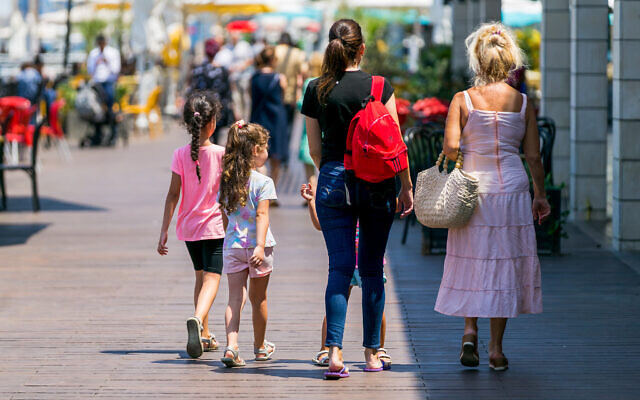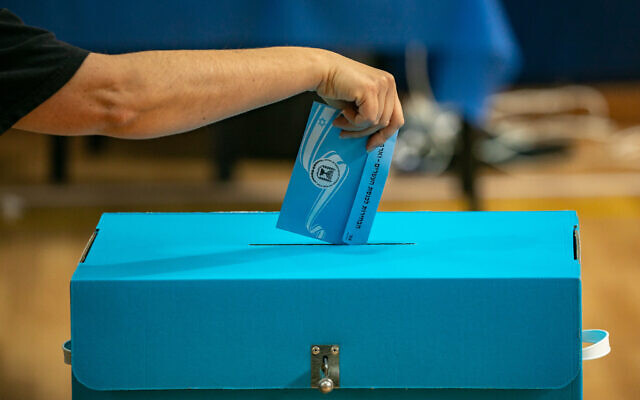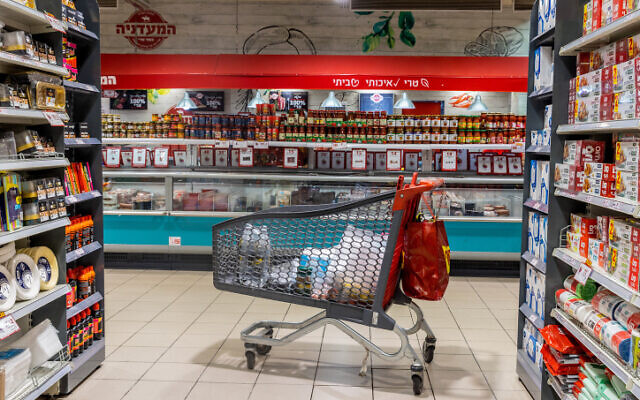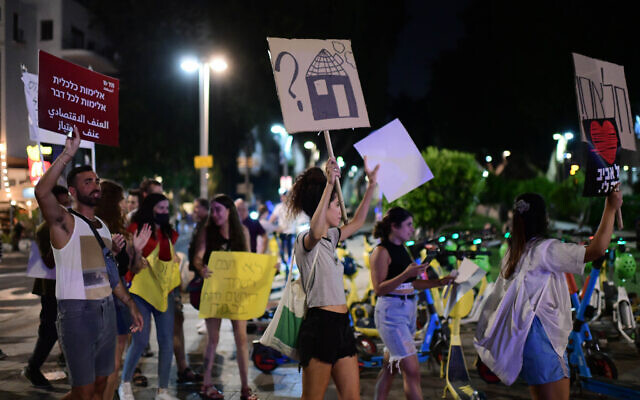Israel’s high cost of living and the general economic environment will be at the top of voters’ minds this November when Israelis head to the polls for a fifth national election since 2019.
According to a survey published Tuesday by the Israel Democracy Institute (IDI), 44% of Israeli respondents said the main factors influencing their decision when voting are a given party’s economic platform and its plan, if any, for addressing the rising cost of living.
For 24% of respondents, party leadership and the identity of the party head was the main factor, according to the Israeli Voice Index survey, conducted monthly for public opinion and policy research.
Another 14% of respondents said their main voting draw was a political party’s policies on religion and state, and 11% said a party’s stance on security and foreign policy was their number one issue.
Just 2% of those polled said their main voting motivator was the climate crisis and a party’s platform on global warming and environmental issues. Five percent responded “other.”
Sign up for the Tech Israel Daily and never miss Israel's top tech stories
The poll was conducted in late July with 600 men and women interviewed by phone or over the internet in Hebrew and 150 in Arabic, constituting a representative national sample of the entire adult population of Israel aged 18 and older, with a margin error of 3.59%, IDI said.

Israelis at a shopping center in the southern Israeli city of Ashkelon, August 8, 2022. (Flash90)
About half of the respondents said that they plan on voting for the same party they voted for in the March 2021 elections.
This sentiment was strongest among respondents who voted for United Torah Judaism. Some 82% of those who voted for the ultra-Orthodox party last year said they will do so once again come November. Over 75% of Likud voters polled for the survey said they would vote for the party again, and 72% of those who voted for Yesh Atid, headed by Prime Minister Yair Lapid, would vote once again for the centrist party.
Lapid served as alternate prime minister and foreign minister in the wide right-center-left coalition established in June 2021 and headed by Naftali Bennett before its collapse this summer. The coalition also included, for the first time, an Arab party (Ra’am).
Except for Yesh Atid, survey respondents who went for parties that were included in the coalition said they were less likely to vote for them again in November. Just 52% of Meretz voters said they would vote for the party again in the upcoming elections, 50% would vote for Yisrael Beytenu, headed by Avigdor Liberman again, and 33% would vote for Blue and White/New Hope, the combined slate of Benny Gantz and Gideon Sa’ar.
In addition, just 2% of Jewish respondents who voted in the 2021 elections said they didn’t plan to head to the polls in November, compared to 21% of Arab respondents who said they planned to stay home on Election Day.

Israelis cast their votes at a voting station in Jerusalem, during the elections for the 24th Knesset, March 23, 2021. (Olivier Fitoussi/Flash90)
According to previous Times of Israel reporting, widespread voter apathy is likely to again keep many Arab Israelis at home, pollsters and analysts have suggested. Two years ago, the four Arab parties rode a wave of high turnout — 65 percent of eligible Arab voters — to a record 15 seats in the Knesset. But the last two tempestuous years in Israeli politics have left both the Joint List bloc and the Islamist Ra’am party deeply battered.
It’s the economy
Among survey respondents, across party affiliations, 85% said they believed Israel’s cost of living was higher than many Western countries.
Based on June 2022 figures from the Central Bureau of Statistics, the Consumer Price Index (CPI) is on track for an annual pace of increase of 5.0% compared to the same period last year. The Consumer Price Index is a measure of inflation that tracks the average cost of household goods. It excludes housing prices which have soared by over 15% compared to last year.
According to the CPI, the cost of food, transportation, and recreation rose while prices for clothing, footwear and fresh fruit and vegetables went down.
As of last week, while the price of gasoline dropped, electricity soared a whopping 8.6%
Survey respondents said their household expenses rose on average by 8.5% this year and housing went up 7%. Their biggest financial burden, according to the report, was food and housing (26% and 25%), followed by energy and taxation costs (15.5% and 13%, respectively). Expenditure on childcare (6%), medical services (4%), tuition (3%), and transportation (3%) were of lesser concern.

A shopping cart at the Rami Levy supermarket in Modiin on July 21, 2022. (Yossi Aloni/Flash90)
Again, differences between Jewish and Arabs respondents were apparent on housing: 29% of the Jew respondents cited housing as their biggest and most burdensome financial expense, compared with just 10% of Arabs. Among Arab respondents, the leading two expense categories were energy (27%) and food (25%).
In addition, 55% of all respondents said their income has not changed over the past year, while 25% said it has decreased. Some 15% said their income has increased.
Among Arab respondents, about 33% said their income has decreased, compared with less than 25% for Jewish respondents, pointing to growing social inequalities.
There were differences surrounding monthly income as well among Jewish respondents, with about 33% of those who earned a below-average wage reporting that their income declined in the last year, compared with just 15% of those with above-average incomes.
Rise and rise
Israel expects moderate economic growth for 2022 amid rising inflation that went beyond even the upper ranges of Bank of Israel forecasts, housing prices that have seen the biggest increase in a decade and have sparked street protests, and consumer costs that have led to calls of boycotts of items and importers.
The celebrated tech sector, which makes up a significant portion of Israeli exports, has been hit with a global market slowdown and layoffs are in the headlines almost every day.

Israelis protest against the soaring housing prices in Tel Aviv and cost of living, on July 2, 2022. (Tomer Neuberg/Flash90)
Overall, said Bank of Israel Governor Amir Yaron last month, the Israeli economy “is in a strong position in many respects.”
“Growth is high, the labor market is tight, the government deficit is low, tax revenues are rising, and businesses continue to report an improvement,” he said after the central bank announced that it was raising benchmark interest rate by half a point to 1.25 percent. The higher rates are designed to restrict the flow of money by making borrowing less attractive, eventually dampening consumer demand, and easing inflationary pressures wrought by an undersupply of goods and an oversupply of cash.
On a less positive note, another national vote — slated for November 1 — presented “an environment of political uncertainty” that was “not good for the economy,” he said.
An IDI study in June estimated that the cost to the economy of the next election will be nearly NIS 3 billion ($873 million).


